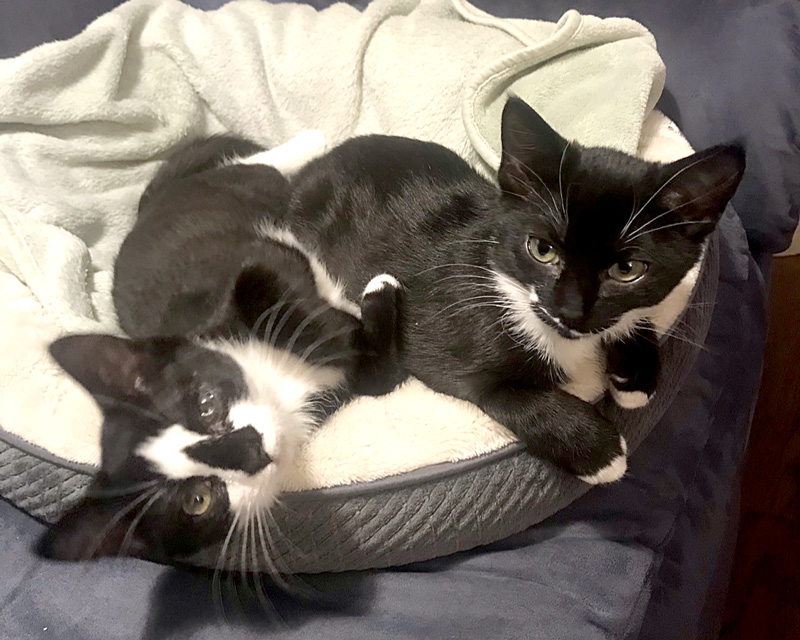- Servicing the Triangle Area: Raleigh, Durham, Chapel Hill, Wake Forest, Cary, and Hillsborough NC
Kitten Care

Congratulations on your new furry friend! It is very important that your kitten is seen by a veterinarian for regular examinations for the first few months of his/her life to make sure he/she is growing normally and to ensure vaccines are given on time. Below is some basic medical information that may be helpful getting your new little one settled at home.
Vaccines
To ensure adequate protection from deadly, but preventable, diseases, vaccines must be given according to each vaccine's label. Some vaccines only require a single administration to achieve protection while others require boosters. Vaccines that require boosters must be given within three to four weeks, or the series of vaccines may have to be restarted. It is very important that you not miss your pet’s booster appointments.
Note that vaccines are not effective immediately after administration; they can take up to two weeks to generate a protective immune response. Below are the core vaccines we recommend for every cat:
- Rabies: A deadly virus affecting the nervous system, transmissible to humans and almost 100% fatal. North Carolina law requires all cats be vaccinated by 4 months of age. Kittens must be at least 12 weeks old to receive this vaccine.
- FVRCP (Feline Distemper): Protects against Panleukopenia, Calicivirus, and Rhinotracheitis. These are serious, potentially deadly diseases. This series usually starts at 6–8 weeks of age and repeats every 3–4 weeks until your kitten is over 16 weeks old.
FeLV and FIV Testing
Feline Leukemia Virus (FeLV) and Feline Immunodeficiency Virus (FIV) are contagious and untreatable. We recommend screening all kittens, usually around 12 weeks of age, because these diseases can mimic other conditions and we want to prevent transmission to other cats.
- FeLV: This virus enters a cat's body and changes the cell's genetic characteristics. It can become dormant, making transmission and prognosis difficult to predict. An effective vaccine is available and recommended for all kittens and any adult cats that go outdoors.
- FIV: A cat can be infected for many years without showing signs of illness. While not contagious to humans, it shares similarities with HIV. There is currently no effective vaccine for FIV.
Vaccine Reactions
A normal response causes minor inflammation as the immune system responds. It is common for cats to be quiet or sleepy on the day of vaccination, and there may be some soreness at the injection site. However, they should return to normal by the next morning.
Emergency Signs: True reactions are extremely rare but life-threatening. Seek immediate veterinary treatment if you see facial swelling, squinting, drooling, vomiting, or difficulty breathing. These usually occur within minutes to a couple of hours after the appointment.
Intestinal Parasites and Deworming
It is very common for kittens to have intestinal parasites. A fecal test can identify specific parasites so we can choose the best treatment. Kittens are typically screened several times during their initial visits, and we recommend annual screening for all adult cats.
Spay and Neuter
This surgical procedure prevents reproduction and offers significant medical benefits, such as a dramatically reduced risk of breast cancer and the prevention of behaviors like marking, aggression, and roaming. Spaying/neutering for cats is generally recommended between 4 and 6 months of age.
The Feline Environment
Cats are intelligent, solitary hunters rather than pack animals. To keep a kitten happy, provide a "vertical" environment with cat trees, shelves, or window sills. They need safe places to hide and appropriate scratching surfaces to maintain their claws (and protect your furniture).
Litter Boxes: The general rule is n+1 (if you have 2 cats, you need 3 boxes). Place them in quiet, low-traffic areas away from food and water. We recommend cleaning boxes daily and using scent-free, clumping litter.
Carriers: Help your cat enjoy their carrier by leaving it out at home with a familiar blanket inside. When transporting, hold the carrier like a fragile gift (from the bottom) rather than by the handle to help the cat feel stable and secure.
Oral Health and Preventatives
Dental Care: Daily brushing is the best way to prevent tartar and periodontal disease. Introducing this routine while they are kittens is the most effective way to ensure they tolerate it as adults.
Preventative Medication: All cats should be on regular heartworm and flea prevention. There is no cure for heartworm disease in cats, so prevention is our only tool. Local Mobile Vet carries Revolution Plus, a monthly topical that covers heartworms, fleas, ear mites, intestinal parasites, and ticks.
 How do I get my pet scheduled?
How do I get my pet scheduled?
If your pet is an existing patient of Local Mobile Vet, simply fill out the appointment request form, and we will reach out to get an appointment scheduled.
If we have never seen your pet before, fill out the New Client Form and we will reach out to help you determine if we are the right fit for you and your pet.
